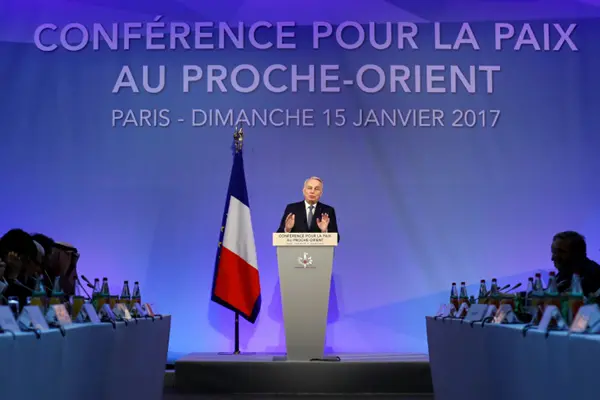A conference for peace in the Middle East on Sunday warned Israel and the Palestinians against taking "unilateral steps" on Jerusalem and on borders that could imperil a negotiated solution to their seven-decade conflict.
Around 70 countries attending talks in Paris called on the two sides to avoid moves that "prejudge the outcome of negotiations on final status issues, including inter alia, Jerusalem, borders, security, refugees."
The participants in the conference "will not recognise" such steps, they warned in a statement.
They also agreed that the basis for the negotiations should be the 1967 borders, before Israel occupied the West Bank and east Jerusalem, French Foreign Minister Jean-Marc Ayrault told a press conference.
France organised the gathering to reaffirm global support for a Palestinian state existing alongside an Israeli state -- a scenario the Palestinians fear could be jeopardised by Donald Trump's incoming US administration.
Neither Israel nor the Palestinians attended the conference, which the Palestinians supported but Israeli Prime Minister Benjamin Netanyahu dismissed as "futile".
US Secretary of State John Kerry, attending the talks on his farewell tour, said he had negotiated to prevent Israel being treated unfairly.
"We did what was necessary to have a balanced resolution," Kerry told reporters and confirmed he had spoken to Netanyahu during the meeting to reassure him.
Israel's controversial wall separating the Jewish settlement of Neve Yaakov (foreground) in the northern area of east Jerusalem and the Palestinian neighborhood of al-Ram (background) in the West Bank. Photo by AFP
Kerry noted that leading Arab nations had endorsed the US outline of a solution which insists on the need for two states, one of them Israel recognised as a Jewish state.
The Palestinians welcomed the closing statement, with Palestine Liberation Organisation (PLO) Secretary General Saeb Erekat saying it had "stressed the need to end the Israeli occupation".
Israel though said the conference, and others like it, made peace harder to find "since they encourage the Palestinians to continue to refuse direct talks with Israel".
Trump pledge
The conference was mainly symbolic, but came at a crucial juncture for the Middle East, five days before Trump is sworn in as president.
Trump has said "there's nobody more pro-Israeli than I am" and his choice for ambassador to Israel, David Friedman, is a hardliner who says he looks forward to working from "Israel's eternal capital, Jerusalem".
The conference came a month after a landmark UN Security Council resolution criticising Israeli settler activity that outraged Netanyahu.
The vote passed after the Obama administration -- in a parting shot at Netanyahu -- took the rare step of abstaining rather than using its veto to protect Israel.
EU foreign ministers are set to discuss the Paris conference's conclusions on Monday.
A European diplomat said it was uncertain whether they would issue a statement, with Britain and some central European countries reluctant to upset the Trump administration.
Britain only attended the Paris talks as an observer and so did not sign the statement.
Israeli-Palestinian efforts have been at a standstill since a US-led initiative collapsed in April 2014.
Tensions have spiralled recently following a wave of Palestinian attacks and inflammatory rhetoric on both sides.
Israel's ongoing expansion of settlements on occupied Palestinian territory is also seen as a major obstacle to a resolution.
Abbas warned starkly on Saturday about the consequences of an embassy move.
"Any attempts at legitimising the illegal Israeli annexation of the city will destroy the prospects of any political process, bury the hopes for a two-state solution and fuel extremism, in our region, as well as worldwide," he said.
(AFP)
 简体中文
简体中文

